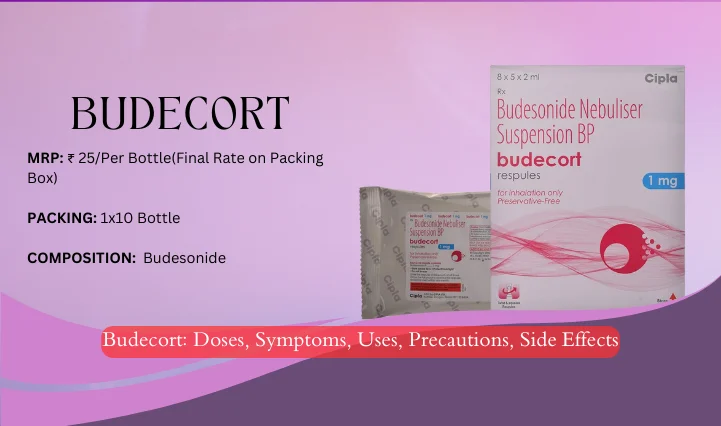Budecort: Doses, Symptoms, Uses, Precautions, Side Effects
Budesonide medication has the brand name Budecort. The medication is a corticosteroid (steroid-based medication) that is primarily used for the treatment and management of Asthma and other respiratory-related conditions. It helps make breathing easier by reducing inflammation in the airways.
Budecort Uses
The uses of Budecort are as follows,
In some cases, inflammatory bowel disease.
- Asthma management,
- Allergic Rhinitis,
- Chronic Obstructive Pulmonary Disease or COPD and
- This medication is available as an inhaler, respules, nasal spray, and tablets.
Asthma Management
It helps manage symptoms such as wheezing and shortness of breath by helping reduce the inflammation in the airways.
COPD and Allergic Rhinitis
It is used in the severe cases of Chronic Obtrusive Pulmonary Disease to help reduce inflammation in the airways. In the form of a nasal spray, it is used to relieve symptoms of nasal congestion and sneezing.
Inflammatory Bowel Diseases
Budecort is used in some cases of Inflammatory Bowel Diseases as well. Some inflammatory diseases such as Crohn’s disease and Ulcerative Colitis. Budecort tablets are mostly used to treat inflammatory bowel diseases.
Budecort Working
The Budecort is a medication that contains Budesonide compound, Budesonide is a steroid and it works in three ways. It works by
- Decreasing inflammation in the airways
- Helping in preventing Asthma attacks
- Reducing the production of mucous in the airways
How To Take (administration) Budecort and Its Doses
Budecort is available in four different forms, inhaler, respules, oral tablets, and nasal spray.
- An Inhaler typically contains 100 mcg or 200 mcg concentration per puff and it can be taken twice daily.
- Budecort respules will require a nebuliser. The recommended dosage for respules is 0.5mg to 1mg per day.
- The dosage of Budecort tablets depends upon the condition the patient is suffering from as well as the doctor’s recommendation.
- Budecort nasal spray can be used once or twice daily and one or two sprays can be done in each nostril.
Budecort Side Effects
The use of Budecort has some common side effects. The patient may experience –
- Sore throat, cough
- Week, scary or husky voice
- Dizziness, headache
- Stomach pain
- Nausea
- Dryness in mouth or throat
Budecort – Serious and Rare Side Effects
In some cases patients taking Budecort can experience some serious and rare side effects are –
- Increased risk of infection
- Long-term use can lead to adrenal suppression
- Prolong use can also lead to osteoarthritis
Budecort Precautions
This medication is not for emergency use or sudden asthma attacks. Further, this medication can increase the chances of oral thrush (bacterial infection of the mouth). Oral thrush can be prevented by regularly rinsing the mouth.
This medication is not suitable for the following group of people –
- Patients with untreated infections
- People with severe liver disease
- People with tuberculosis
- It may not be suitable for pregnant or breastfeeding women
Budecort Interactions With Other Medications
This medication can interact with other corticosteroids, leading to more side effects. Further, it should not be combined with strong CYP3A4 inhibitors such as ketoconazole, and ritonavir.
Budecort Storage
Budecort should be stored in a cool dry place away from direct sunlight. Incase inhalers and respules in a sealed packet to avoid cross-contamination. For inhalers, do not puncture them.
Frequently Asked Questions
Ans. No, this medication is not for emergency use and can’t be used during an asthma attack.
Ans. Depending upon the condition it can take from a few days to a few weeks.
Ans. In rare circumstances a doctor may prescribe low-dose Budecort inhalers or respules for nebulisation for children.
Ans. Long-term use can cause weight gain.

